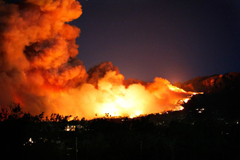
Even for the literal-minded, it's hard not to lump the conflagrations on Wall Street with those in Southern California. The meltdown of 401(k)s with the street signs at Sylmar. The frantic, ever-escalating press conferences and bailouts of any significant credit institution with the desperate deployment of ever-greater masses of engines and helitankers, all equally ineffective.
Somehow the spark of a credit crunch managed to leap over fiscal firewalls and spread throughout the economic landscape, much as relatively small blazes blew over I-5 and threatened the power supply of Los Angeles. The general destruction has moved upscale, so that trophy homes burn along with trailer parks, and hedge funds with day traders. When the winds blew, they exposed any combustible object to embers, and threatened to incinerate anything vulnerable. The entire system, it seems, is vulnerable, and everyone knew that the winds always blow. It's just been convenient to pretend otherwise.
In the late 19th century Bernhard Fernow looked over the American fire scene and condemned it, as only a Prussian forester could, as the result of "bad habits and loose morals." There was no excuse, he huffed, for these annual conflagrations. We might restate his observation today with only slight alterations. The American fire scene remains the product of bad habits in its refusal to apply the most primitive standards of hazard zoning and building fire codes, and for its inability to replace feral fire with tame fire.
It remains the product of loose morals in the form of loose money and the political shenanigans that hide their infiltration through institutions. Those subprime loans have made it possible to occupy subprime landscapes, and America's fire agencies have unwillingly hidden the full risk by protecting sites that are really beyond their charter. It's a kind of pyric moral hazard.
The country now has, apparently, millions of homes in excess of its citizens' ability to pay for them. It has occupied landscapes that we cannot hope to hold against wildfire. The mixing of the wild and the urban is the landscape equivalent of securitizing mortages. Most of the worst risks are hidden in ill-conceived exurban enclaves built over the past 25 years.
Privatize profits, but not losses
If today's outcome is a bear market for securities, it's been a bull market for burning.
The response to both seems to be, privatize profits and socialize losses.
It's not as though history is helpless to suggest solutions. We've been through this before when the agricultural frontier slashed and burned its way across the continent and littered the country with incinerated towns. Then, too, there was a problem with enforcing boundaries because landclearing fires routinely bolted into forest and park reserves.
Now the problem has inverted, and it is the fires that breed in wildlands that threaten settlements outside the fence. The bad old days ended, curiously during the 1930s amid drought and Depression, when active intervention segregated the two landscapes. (Unfortunately the process then went too far and the feds decided to suppress all wildland fires, not merely quarantine them, helping to stoke today's outbreaks.) Certainly fire affirms Robert Frost's observation that something there is that doesn't love a wall, and it confirms his conclusion that good fences make good neighbors.
Fundamentalists get us burned
There are no absolute assurances that wildfire will not from time to time spill over into settlements, any more than markets won't fizz and bubble; but we know how to keep such outbreaks from happening routinely. It's messy, irritating to fundamentalists (both those of the wilderness and of the market), and not cheap. So far, we continue to drop money and fire retardant on the flames. That may not quench the fire but it makes good political theater.
At some point, however, the money will run out completely and it will no longer be possible to pretend that we can rebuild; everything will simply burn to ash. We will have to deal with the landscape itself. The power of fire resides in its power to propagate: you control that power by controlling fire's environment. So too the power of fiscal contagion requires control over the entire scene.
For the present we're caught between two nasty fires. It's time we put some distance between ourselves and both of them. We can't control the winds, we only know they will blow again.
Related Tyee stories:
- How B.C. Was Built to Burn
From Barriere to Whistler, forest communities are designed for a fire catastrophe. Have we finally learned? - What I Learned Fleeing the Tumbler Ridge Fire
Human kindness, and what to keep close to your heart. - Six Ways Harper Is Wrecking the Economy
Need evidence? Look south.
Read more: Politics, Environment














Tyee Commenting Guidelines
Comments that violate guidelines risk being deleted, and violations may result in a temporary or permanent user ban. Maintain the spirit of good conversation to stay in the discussion.
*Please note The Tyee is not a forum for spreading misinformation about COVID-19, denying its existence or minimizing its risk to public health.
Do:
Do not: